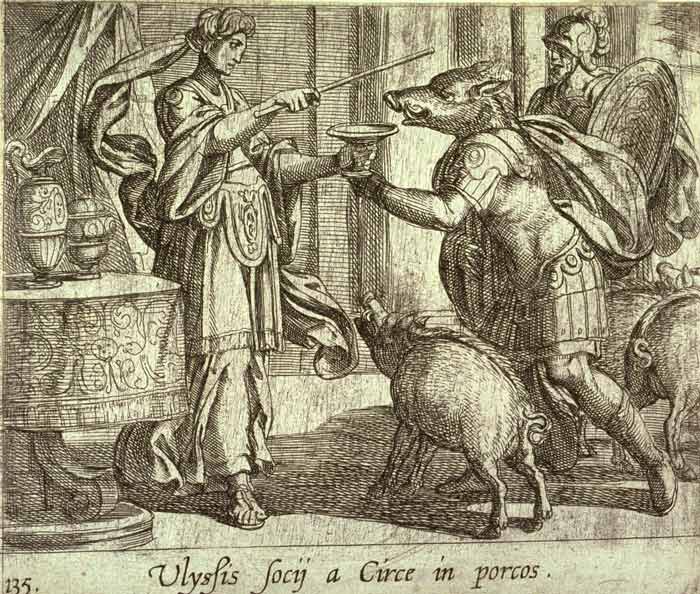Jenny Hall
Dhammapada 327
Verses from the Dhammapada
Jenny Hall investigates what it meant when the Buddha said ‘"Be watchful and guard your thoughts",

Circe Changing Ulysses’ Men to Swine. 17th-century etching 4.1 x 4.6 in. (10.3 x 11.8 cm.) by Antonio Tempesta (1555-1630) - illustration from Ovid’s Metamorphoses, plate.135
"Be watchful and guard your thoughts"
One of the hindrances to following the Buddha’s Way is mental agitation.
I often used to have a nightmare of sitting in an exam, looking at the paper and then realising I had failed to do any revision. I was unable to answer even one question. The dream seemed to be pointing not only to the fear of being out of control but also to being "nothing".
In a constantly changing, uncertain world we vainly endeavour to make the ephemeral "me" secure. To this end we indulge in endless daydreams. These daydreams create the illusion of "me". In Shakespeare's The Tempest, Prospero says,
"We are such stuff as dreams are made on”.
Clinging to these thoughts streams exacerbates worry and tension. During the peak of the COVID-19 pandemic studies revealed there was a sharp decline in mental health, especially amongst the young. They complained of being plagued by obsessional thoughts and constant feelings of anxiety.
In the same way that we wake up from a nightmare, the Buddha taught that it is possible to wake up from all this mental anguish. To be freed from suffering, the delusion of "me" must be emptied out. This release is expressed as one of the steps of the Buddha’s Noble Eightfold Path called right effort.
When we are preoccupied, it is always with thoughts of yesterday or of tomorrow. The Buddha’s path is not a path leading from A to B. Each step occurs now in each moment. Recently on the TV programme, The Repair Shop, a woman brought in a decorative piece of carved wood to be mended. It bore the words,
"Today is the day we worried about yesterday. All is well".
The Zen training leads us to this realisation. The right efforts of wholeheartedly suffering the churnings of fear, anger and desire burn me away. The right effort of not "I" doing but wholeheartedly giving myself away into the daily life practice empties out "me". The right effort of giving myself into counting the breath in Zazen opens the door to the "I"- less. In such right efforts, Choiceless Awareness, the Buddha Nature is revealed. The dream of ‘me’, made up of all my worries and preoccupations melts away. Reality is seen and compassion, goodwill, joy and serenity arise.
In one of the Greek myths, Ulysses sailed his galley into a harbour. He and his men had suffered many hardships. They remained resting for two days. On the third they ran out of provisions. The men began to complain bitterly. However, not one was prepared to explore the island for food. Ulysses bravely set off alone. He spotted signs of human habitation and on the way back killed a buck. After supper they drew lots to decide who should explore further. Ulysses put his friend Eurylochus in charge of the reconnaissance. All the men under his charge continued to grumble. Eventually, they came across a magnificent Marble Palace shining in the morning sunlight. Unbeknown to them it belonged to Circe, the enchantress. At the entrance a golden haired woman ushered them in. Eurylochus held back and stayed outside. The palace was decorated with exquisite furnishings. They were served with fine wines. Delightful aromas floated from the kitchen. The men laughed at the thought that the others were missing out on such pleasures. Suddenly the woman's gracious smile changed to a terrifying frown. She began to strike the men with her wand. Immediately they changed into swine and were driven out of the back door to the styes where they were fed acorns. When the men failed to emerge from the palace, Eurylocus reported their loss to Ulysses. Ulysses set off for the palace himself. On the way he met Mercury who told him that Circe had cast a spell on his men. He handed Ulysses a white flower as an amulet against Circe’s power. When Ulysses arrived at the palace, Circe mixed him a magic potion. Holding the white flower, he drank it without fear. She struck him with her wand but he retained his human form. Circe fell on her knees before him. He ordered her to change the swine back into men. Filled with joy and gratitude they realised how selfish they had been. From that day they ceased grumbling and considered the good of others.
Circe creating delusions points to those the "I" creates. The swine point to the suffering that follows. The white flower points to choiceless awareness. The men's joy, gratitude and goodwill point to the at-one-ment with all in its presence.
Ariel expresses this in The Tempest: ,
‘Where the bee sucks, there suck I
In a cowslip’s bell I lie…
Merrily, merrily shall I live now
Under the blossom that hangs on the bough.’




